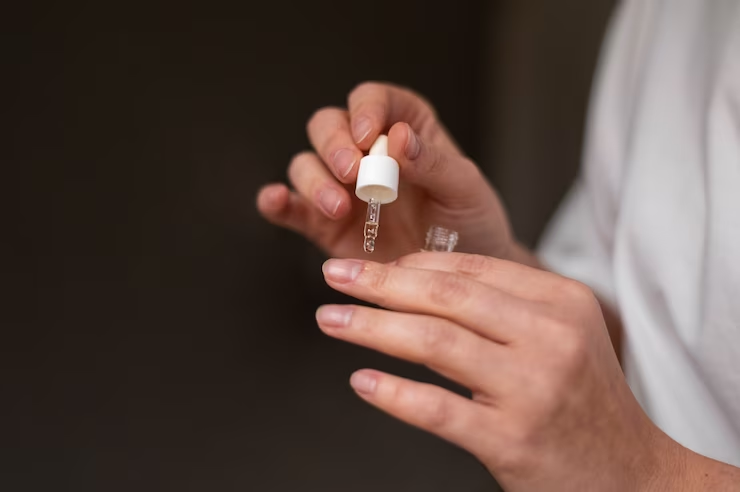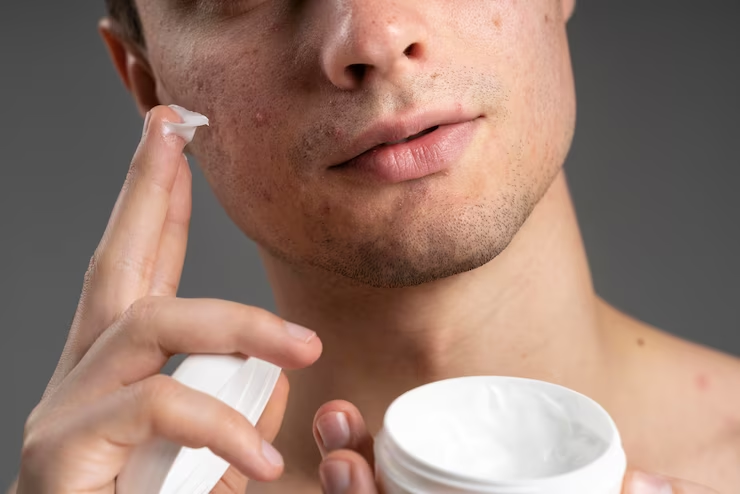
Acne can affect people at any age, but generally speaking, it tends to start during puberty and then taper off as you get older. However, this pattern isn't always consistent: some people who didn't have acne as teenagers may start experiencing it later in life—and vice versa.
According to the American Academy of Dermatology, nearly 1 billion people worldwide suffer from acne. It is estimated that 40-50 million Americans have acne and that 85% of them are younger than 25 years old.
One of the more common ingredients that we hear about is hyaluronic acid. It's found in many beauty products such as moisturizers, serums and masks. But does hyaluronic acid help with acne? We'll answer that question below by looking at the research behind hyaluronic acid, as well as its benefits for treating acne.
What is Hyaluronic acid?
Hyaluronic acid is a natural substance found in our bodies that helps to keep skin hydrated and plump. As we age, it tends to break down and become less effective at retaining moisture. This can lead to dry, flaky skin and dullness—and the symptoms of aging.
One of the best ways to improve skin elasticity is by using hyaluronic acid products—whether in your skincare routine or through injections. When you apply a hyaluronic acid serum or product, it helps to smooth out wrinkles and fine lines and increase hydration.
How does hyaluronic acid help with acne?
When you have acne, it can be difficult to maintain a healthy routine. Your skin is often oily and prone to breakouts, which makes using traditional skincare products ineffective.
Luckily, hyaluronic acid is a powerful substance that can help treat acne in a number of ways. It has been shown to improve the appearance of skin when used as an ingredient in topical creams and serums.
Hyaluronic acid helps with acne by binding to water molecules and holding them close to your skin's surface, which helps to hydrate the skin, making it look more vibrant and smooth. It also has the ability to attract other molecules like collagen, which helps to regenerate skin tissue and reduce inflammation.
How To Incorporate Hyaluronic Acid Into Your Skincare
If you're looking for a way to incorporate hyaluronic acid to help with your acne into your skin care routine, there are several ways you can do it:
Use a face mask that contains hyaluronic acid. This will help to moisturize your skin and reduce dehydration, which is one of the main causes of aging.
Use eye cream with hyaluronic acid in it at night before bedtime. This will help hydrate your under-eye area while you sleep and make you look more refreshed when you wake up in the morning.
Try using a moisturizer with hyaluronic acid during the day—it'll keep your skin feeling soft and smooth all day long!
Benefits of Using Hyaluronic Acid for Acne
Promotes supple and radiant skin
Hyaluronic acid helps with acne through its anti-inflammatory properties, which means it can help reduce the appearance of wrinkles by reducing inflammation. It also helps prevent acne by binding moisture to your skin, which prevents clogging of pores and reduces irritation from existing pimples.
Lightens scars
Hyaluronic acid, when applied topically, can help lighten acne scars. The acid's molecular structure allows it to bind with water molecules, which makes it a great moisturizer. It also helps prevent collagen breakdown and speeds up healing time for damaged skin cells.
Speed Up Healing
Hyaluronic acid helps with acne by retaining moisture and protecting against free radicals, hence, actually speeds wound healing by regulating inflammation levels. It slows down the inflammatory process so that your body can focus on fighting off infection and repairing itself.
Repair skin barrier
Hyaluronic acid helps with acne as an excellent moisturizer that can hold up to 1000 times its own weight in water. It’s also good at repairing the skin barrier—the outermost layer of skin that protects us from the environment—as well as helping the skin retain moisture.
Potential side effects or precautions to consider
While hyaluronic acid is generally safe and effective, there are some potential side effects.
You may experience irritation or develop an allergic reaction if you are sensitive or allergic to an ingredient in this product.
While most people have no issues, some experience mild reactions at the injection site. These can include redness, swelling and itching for up to 48 hours after treatment.
Improper sanitizing of the equipment used during the injection process can lead to a bacterial infection—which can become very serious if not treated right away.
How To Use Hyaluronic Acid for Acne

Topical treatments
Topical treatments are easy to use and have no side effects, making them a great option for those who want a simple way to clear up their acne breakouts. Just apply a small amount of hyaluronic acid to the affected areas of skin twice per day, once in the morning and once at night.
You may experience mild irritation at first, but this will go away after a few days as your skin adjusts to having an active ingredient on it.
Oral supplements
Oral supplements that contain hyaluronic acid are designed to support healthy skin by promoting collagen production and improving hydration levels in your body. In addition, they can help fight aging by boosting collagen production and reducing fine lines and wrinkles on the surface of the skin.
Injections
Hyaluronic acid injections are a popular treatment for acne, particularly for people who have large pores. Hyaluronic acid helps with acne by reducing the size of your pores so that dirt and oil cannot get trapped inside them. It typically lasts about six months before they need to be repeated.
Is It Safe To Use Hyaluronic Acid?
In most cases, hyaluronic acid is safe for use. However, there are a few instances in which you should avoid using it:
Allergic to hyaluronic acid
-- If you're allergic to something, then it's best not to put additional products containing that ingredient on your skin. If you have an allergy, be sure to do patch testing before using any product containing hyaluronic acid as an ingredient.Sensitive/reactive
-- People with sensitive skin may experience irritation from this ingredient due to its ability to increase moisture levels in the skin.Lifestyle factors and Habits That Causes Acne
Acne can be caused by a variety of factors, but some lifestyle habits and conditions may also contribute to the formation of acne. Here are some things that you can do to reduce your risk of developing acne:
Smoking
Smoking is associated with a higher risk of developing acne, including inflammatory and cystic acne.

High-glycemic diet
Research has shown that consuming foods that are high in sugar can increase the amount of insulin in the body, which can cause increased sebum production and block pores, resulting in acne.
Alcohol consumption
Consuming large amounts of alcohol can lead to dehydration, which can cause your skin to produce more oil to compensate for the lack of moisture on your skin surface (which can lead to an increase in acne).
Hormones
People who have higher levels of male hormones tend to develop more severe acne than those with lower levels of male hormones. This is because male hormones activate the sebaceous glands in the skin, which cause oil production and therefore clogged pores.
Stress
Stress affects our body's ability to regulate hormone levels, which can lead to flare-ups in acne breakouts. Stress also causes us to produce more oil on our faces, which clogs pores and causes inflammation around them
Lack of sleep
Sleep deprivation is associated with an increase in inflammatory chemicals in the body, which can contribute to breakouts on your face or back. While it might seem like you don't need much sleep, research shows that we actually function better when we get at least 8 hours per night (and ideally more).
Frequently Asked Questions
Can you use hyaluronic acid with retinol?
Absolutely! You use hyaluronic acid with retinol to help to keep your skin moisturized and healthy while also helping to stimulate new cell growth, which will make your skin look younger.If you want to use both products together, start with your retinol first and wait until it's fully absorbed before applying hyaluronic acid. That way, when the hyaluronic acid starts to sink into your skin and add moisture back into it, there won't be any irritation from the retinol still lingering on top of it.
Can I use hyaluronic acid with niacinamide?
Yes, you can use hyaluronic acid with niacinamide.Both of these ingredients are part of the vitamin B complex, which is essential for the proper function of your body's metabolism. Niacinamide is also known as vitamin B3, and it is often used to treat acne and skin discoloration (including dark spots). In addition, it can help fight inflammation and reduce redness in the skin.
Can hyaluronic acid cause acne?
If you're using a product with high levels of hyaluronic acid, this could also cause irritation and breakouts. The best way to avoid these issues is by testing out different products on yourself before purchasing them. Make sure they work for your skin type and won't cause any inflammation or redness when applied topically.To wrap things up...
Overall, hyaluronic acid is a promising ingredient for treating acne. It works by reducing inflammation, increasing hydration, and restoring the skin's natural barrier function—all of which help to clear up pimples.
This can be done by adding it to your daily skincare routine or using it in conjunction with other treatments such as benzoyl peroxide. The main drawback with using hyaluronic acid for acne is that it may take time before you see results. However, if you are willing to wait, you should notice results within a few weeks of using this product regularly on your skin.
You should also consult with your dermatologist before starting any new medication or supplement, especially if you are pregnant or nursing.









